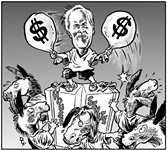Capitol Chronicle
The Politics of Privation: boom or bust, the poorest go right on paying
By Michael King, Fri., May 10, 2002
It was not a lighthearted afternoon. U.S. Rep. Lloyd Doggett began by sketching the outlook for congressional progress on health care: freezes on funding for maternal and child health care, research and care for AIDS, and a wide range of other limitations. For seniors, Doggett said to expect the Bush administration and the Republican-controlled House to push for "voucher-type" health care services, with the elderly increasingly expected to find, and pay for, medical services on their own. Doggett also noted that the "conservative" Bush budget in fact requests the biggest increases since the wartime budgets of the Johnson administration: He called it a "guns and caviar" budget, with enormous increases for the Pentagon and a concerted effort to make permanent last year's massive tax cuts, the benefits of which will go overwhelmingly to the wealthy.
Former Commissioner of Social Security Kenneth Apfel, currently at the LBJ School, described what Social Security and Medicare had meant over the past four decades. In 1960, one-third of the elderly population lived in poverty, and virtually none had health insurance; today, about 10% live in poverty and 90% have health insurance. Those dramatic changes didn't happen by capitalist magic, but because we had created nationwide, community solutions to problems which simply could not be solved by the private market. Now the primarily Republican call is to "privatize" the system, which Apfel emphasized is not only a question of gambling funds but of defining national values, of how we sustain each other as a community. "We need to resume a national discussion about values," Apfel said, "about the importance of our collective institutions as a people."
Former Secretary of Labor Ray Marshall, now a professor at UT, described his work on the Austin Equity Commission, arguing that the long-range prosperity and security of any nation -- certainly a democratic one -- relies heavily on equity as a goal: "If you're concerned about the country, you should be concerned about equity." He described as misdirected the current mania for school testing while resources decline, and called instead for a "real accountability" for education: "accountability of schools, teachers, parents, and politicians."
Mayor Pro Tem Jackie Goodman talked about the consequences of the economic downturn on Austin, with decreasing sales tax revenues, increasing costs and mandates, and the increasing diminution of both state and federal sources of funding. She described the task of the next City Council as one of "sustainable survival" -- to balance an already strained budget without "gutting" basic and necessary services.
Deepening the Crisis
By the time Naishtat spoke, he joked that anyone expecting better news from his state legislative perspective had better head for the door. The already alarming $5 billion shortfall predicted for this biennium (which doesn't end until August 2003) is based on current service levels, which do not allow for additional and growing needs. In fact, he said the effective shortfall is closer to $8 billion, in a state that is frankly "miserly, cheap" when it comes to spending on basic social services. Yet Naishtat reminded his audience of $1 billion in tax cuts in the 1997 Legislature, more than $2 billion in 1999. (You will recall that at the time, the governor's name was Bush -- although the Lege was overwhelmingly submissive in the matter.)
Just some of the current results: a $24 million shortfall for children's health insurance; $142 million for Medicaid; $67 million for foster care; $7.5 million for "special care" children, who cannot survive without it.
The Bush administration response to these kind of persistent state numbers? To demand that welfare mothers work 40 hours instead of 30, and that states increase their work placement of welfare recipients from 30% to 70% -- without a dime of additional money for job training, job placement, or day care. Of 50 governors surveyed about these proposals, 48 (more than half Republicans) responded, in effect, "We cannot fulfill these mandates without more money." One of the two exceptions was Gov. Rick Perry.
Naishtat summarized these forbidding conditions in basic human services for a state of 20 million, at least 4 million of whom live in poverty: "Texas is already in crisis, and the administration's response is to make it worse."
Blood From Stones
Last week Perry, Lt. Gov. Bill Ratliff, and Speaker of the House Pete Laney, monitoring the budget shortfall, sent a letter to state agencies asking them to identify additional savings wherever they could -- and to hold that money in reserve. The Health and Human Services Commission has already said that it could pull monies from the Medicaid Trust Fund, raise co-payments and limit reimbursements for medicines, and reduce hospital reimbursements as well. In other words: take the money from those Texans who by definition are the least able to afford it.
Naishtat said of the leadership's letter, "I don't find any fault in attempting to be fiscally prudent in light of the reality of a serious shortfall. But I think it's going to be a very difficult session in terms of health and human services funding, which historically in Texas is consistently at criminally low levels.
"It's troubling to me that the proposed savings seem to be focused on the needs of and services provided to the most vulnerable Texans. What is being proposed and being discussed is a co-payment and enrollment fee for Medicaid, as well as an increase in the current co-payment for C.H.I.P. [the children's health insurance program].
"Until we get the guts to meaningfully address the revenue problems in this state," Naishtat concluded, "we will continue to look at the arena of health and human services for savings. We can't go back to that well forever, especially in light of the fact that that well has been close to dry, ever since I was elected to the Legislature, in 1991." ![]()
Got something to say on the subject? Send a letter to the editor.








